The Black Book of Gambling: It's Worth 7.2% of GDP, but the Lobbies and Mafias Are the Ones Who Profit

While we wait for official data , we have important updates on the gambling phenomenon in Italy thanks to the Black Book which, numbers in hand, shows us how gambling touches the lives of all of us. Even if we have never bought a scratch card.
In 2024, 157.4 billion euros were gambled, which is equal to 7.2% of GDP. This data would be enough. Instead, the report, produced by Cgil, Federconsumatori and Fondazione Isscon, provides us with a broad and detailed mapping to show us that these 157.4 billion did not enrich the players, but rather filled the gambling lobbies, the mafias and, only to a lesser extent, were part of the state treasury (about 11 billion euros). Furthermore, these 157.4 billion have earned us a primacy in Europe, while the National Commission tells us that gambling is now the second source of income for the mafias, after drug trafficking.
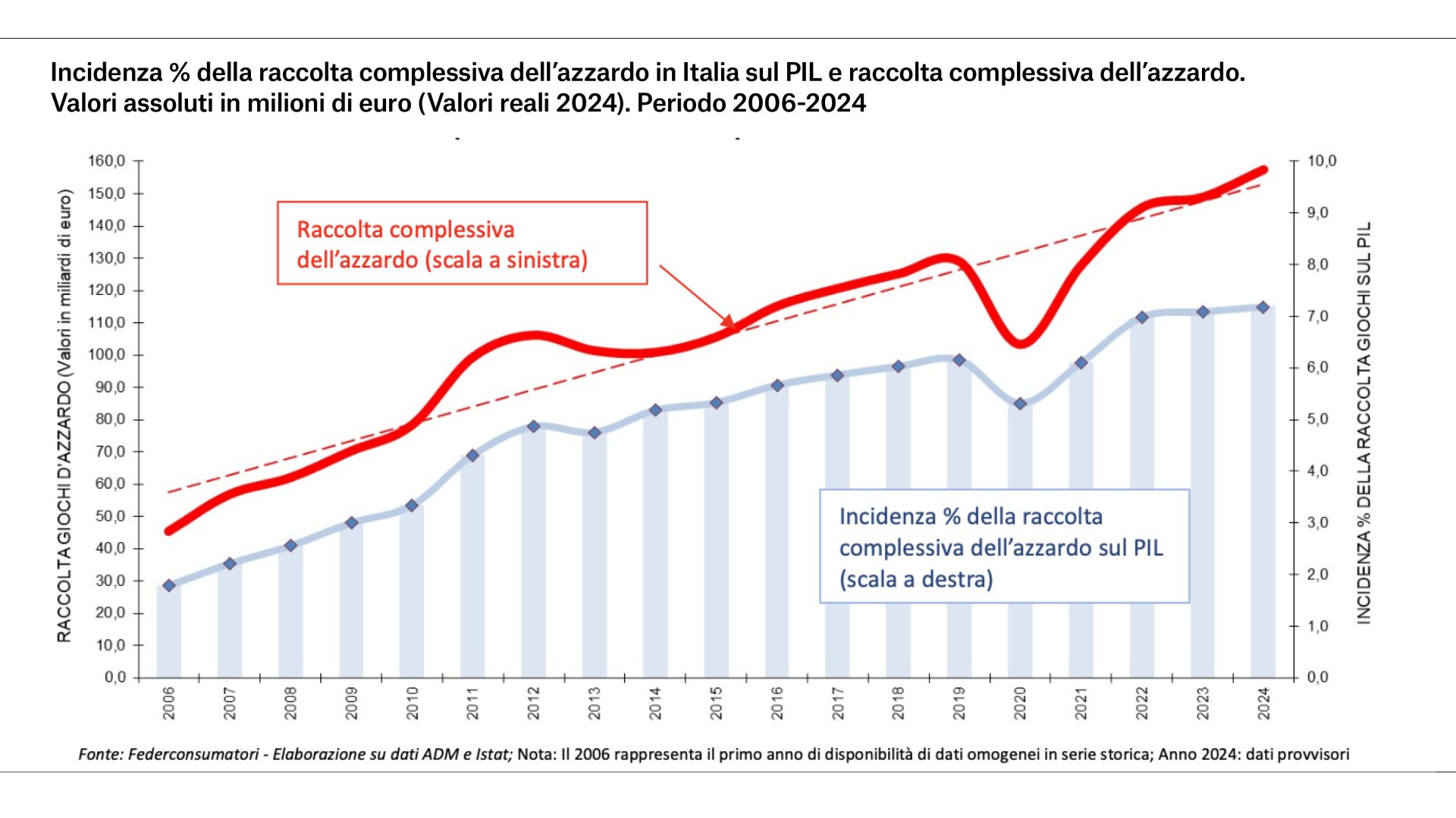
This third edition of the Black Book comes out in the midst of the discussion of the law for the reorganization of the gambling sector and was created not without difficulty, as can be read in the introduction to the report: «In addition to the obstacles caused by incorrect rules that prohibit the dissemination of territorial data for the majority of physical gaming, there is also the behavior of Adm (Customs and Monopolies Agency), which has progressively and unjustifiably expanded the areas of censorship, extended this year to online data for small centers and to some physical games, not included in the ban. Added to this is the extreme use of response times to civic access that we have advanced, the constant definition of data as provisional and partial, the significant discrepancies with respect to data disseminated by Adm itself and the lack of care in defining some territorial elements. Above all, there is the overcoming of the fundamental Blue Book that concerned the complex of activities of the Customs and Monopolies Agency, the last edition of which now dates back to 2023 with data for 2022… ».
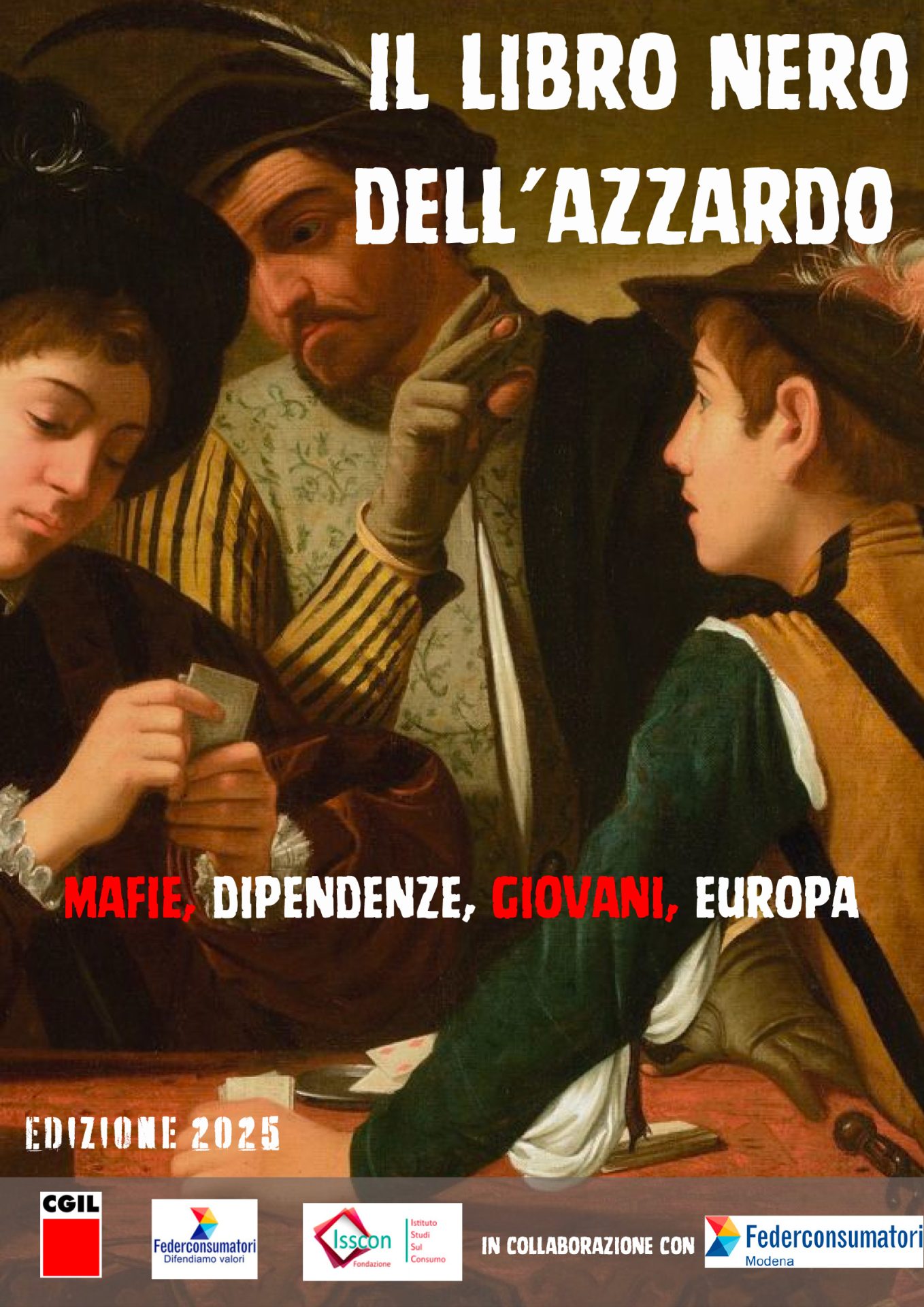
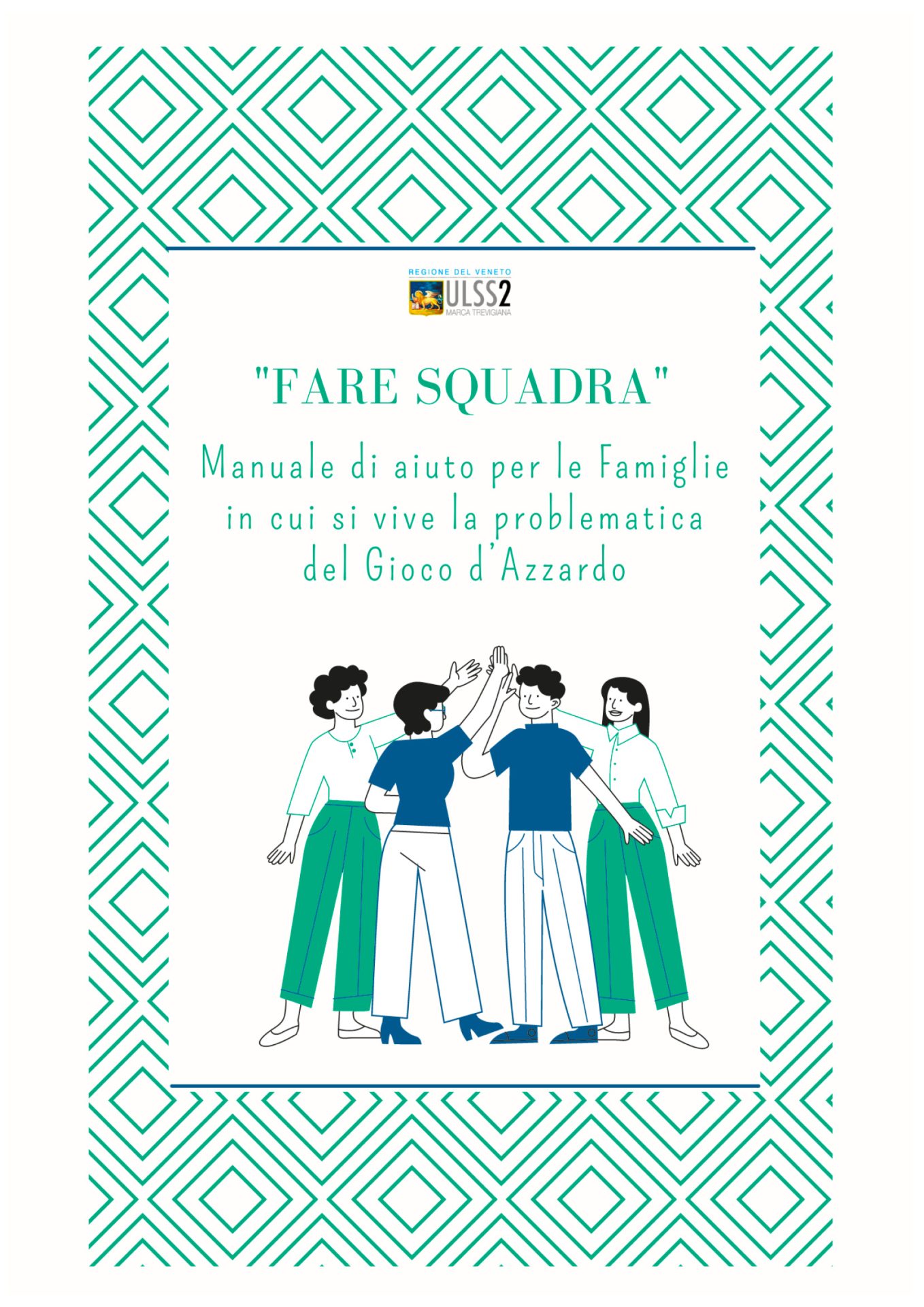
And so today the only ones to provide data regularly are the big players in the sector, through collateral websites, disguised as "public utility" portals, while not even Istat has information coverage on the matter. Also because international comparative statistics, from official sources, are now dated, "as if from the pandemic onwards a path of "information blackout" of the phenomenon had been undertaken even at a global level".
The numbers in the Black Book incontrovertibly demonstrate that we are all involved in gambling. We are all truly at stake, because we are all affected by it and therefore we are called to understand the phenomenon so as not to be overwhelmed. In fact, gambling contains our salaries, public health, and young people at risk of addiction. While the State does not want to give up the tax revenue derived from gambling and which is around 11 billion a year, the gambling industry with advertising and management of the supply chain has achieved a great work of normalization that has introduced gambling into our daily lives.
Meanwhile, the 2025 budget law has abolished the National Observatory for the fight against pathological gambling, cancelled the fund for gambling addiction (initially 50 million euros, then reduced to 44 million) and established a single fund for addictions worth 94 million, of which only 30% to be allocated to pathological gambling. The fourth weekly lottery draw, introduced for the reconstruction of Romagna after the flood, has also been made structural. "There are many factors that lead to the illusory idea that a win can solve, in one fell swoop, economic problems. Among these is the growth in gambling advertising, also through instrumental invitations to responsible gaming which are nothing more than the circumvention of the remaining bans."
The incredible figure of 157.4 billion euros collected in 2024, equal to 7.2% of GDP, is, just to be clear, 20 billion more than the overall healthcare expenditure for our country. In 2023, the growth was 6.6%, in 2019 42.5%. These numbers mean that the collection per capita for each adult citizen has reached 3,137 euros. So all of us who have turned 18, every year, lose 3,137 euros, even if we have never placed a bet or inserted a coin into a slot machine. The Black Book also tells us that the overall losses correspond to the average net income of 1,150,000 full-time workers and that the overall economic loss we had in 2024 due to gambling is 23 billion euros.
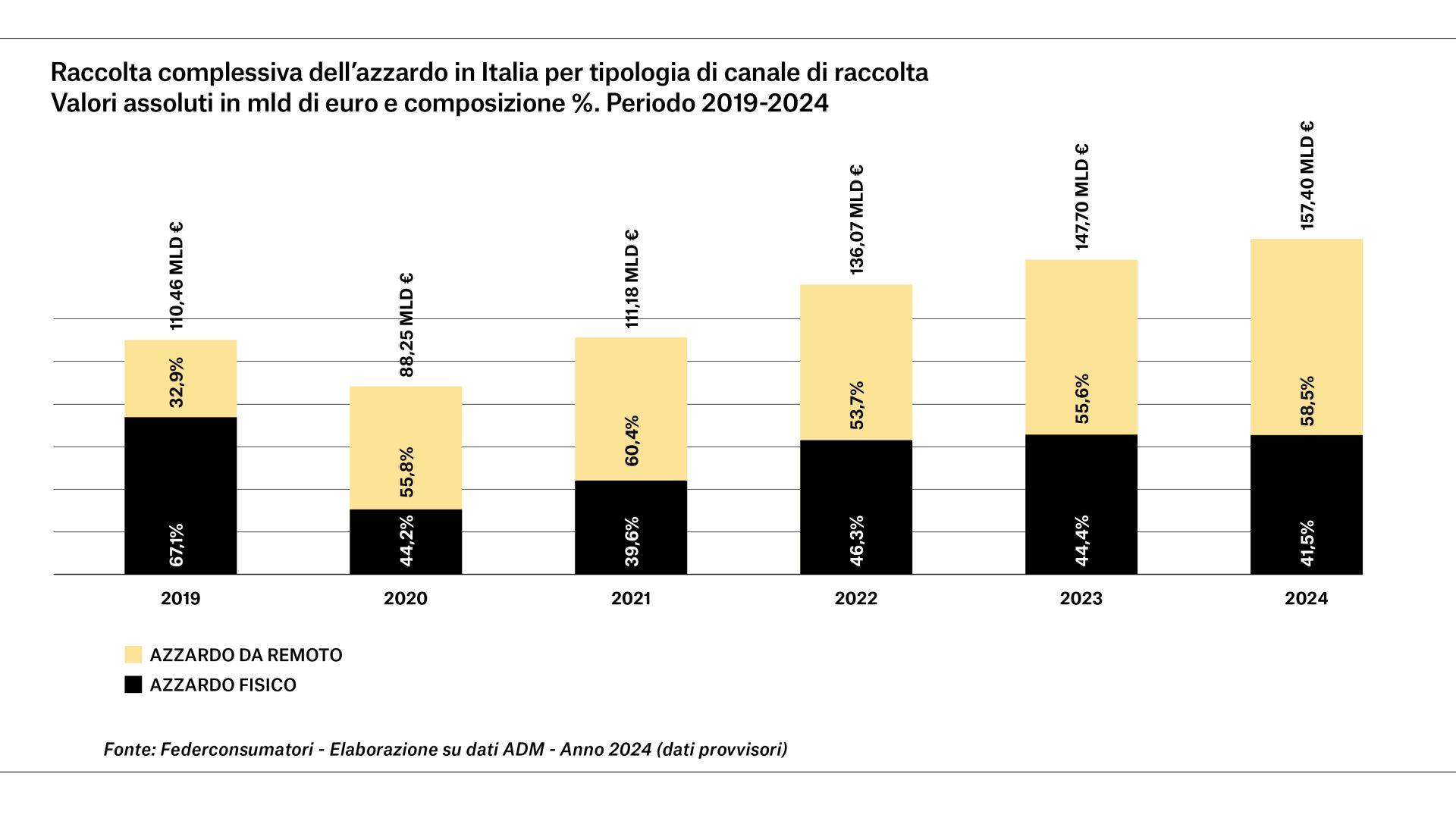
Of these 157.4 billion, 65.3 come from physical gambling: a value that is essentially unchanged with a very slight contraction, compared to 2023 and still below the pre-pandemic values which were over 74 billion euros collected in 2019. Instead, 92.1 billion is the figure for online gambling which has been in continuous and unstoppable growth since 2020. Specifically, it increased by 10 billion in 2024, recording a +12.2%, especially in the Center-South, where organized crime uses online gambling for money laundering. Active online accounts have now exceeded 20 million, and are therefore close to 1 in every 2 citizens in the 18-74 age group. Obviously, a single player can have multiple gaming accounts, however, it is estimated that there will be 4.5 million active online players in 2024, an increase of almost 10%. The most popular online games are card games, online casinos, sports betting and Betting Exchange.
Massimo Masetti, Avviso Pubblico 's gambling representative who participated in the presentation of the Blue Book and studied the data, helps us get an idea of the phenomenon, using as a "term of comparison the sum of the budgets of the Municipalities for the provision of services that comes to 77 billion, therefore less than half of what is spent on gambling every year in Italy". On the other hand, it is a continuously growing trend that is well understood if we analyze the evolution of gambling in the last twenty years 2004-2024: "We see that spending on gambling has increased by more than 650%, while the tax collection has increased much less, that is, by 54%"
Italians are the top players in Europe. No Olympic record, rather a paradoxical podium. We are the European countries with the lowest purchasing power of income from work and pensions and with the highest overall loss in gambling.
As the report states: "There are many factors that lead to the illusory idea that a win can solve, in one fell swoop, one's economic problems; among these is the growth of gambling advertising, also through instrumental invitations to responsible gaming, which are nothing other than the circumvention of the remaining prohibitions."
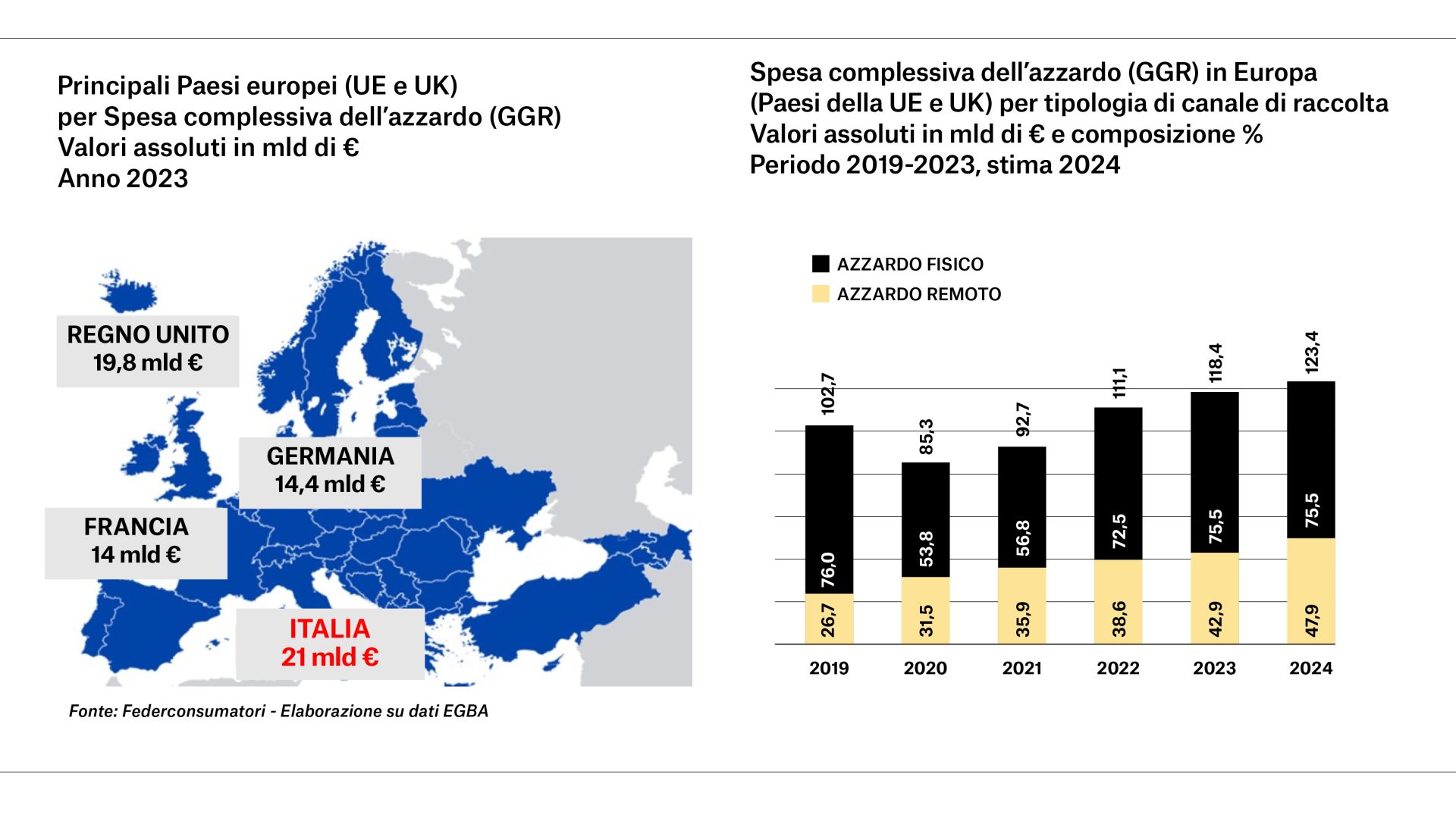
The Black Book analyzes online gambling bets and volumes by Regions, Provinces and capitals. It emerges that Campania and Sicily occupy the top positions in the national ranking, while among the provinces in first place is Isernia, followed by Syracuse, Messina and Palermo, then Salerno, Naples and Caserta. Then Reggio Calabria, Taranto and Teramo. The data from Isernia stands out, the smallest capital in Italy and the first for bets per capita online only: in 2022 it recorded 2,686 euros per person, rising to 4,143 in 2023, becoming 6,853 euros in the 18-74 age group. Up 155% in two years! It is believed that the territory, despite not having indigenous criminal groups, offers fertile ground for the expansion of mafias from neighboring regions such as Puglia, Campania and Lazio, as well as being a safe hiding place for criminals on the run.
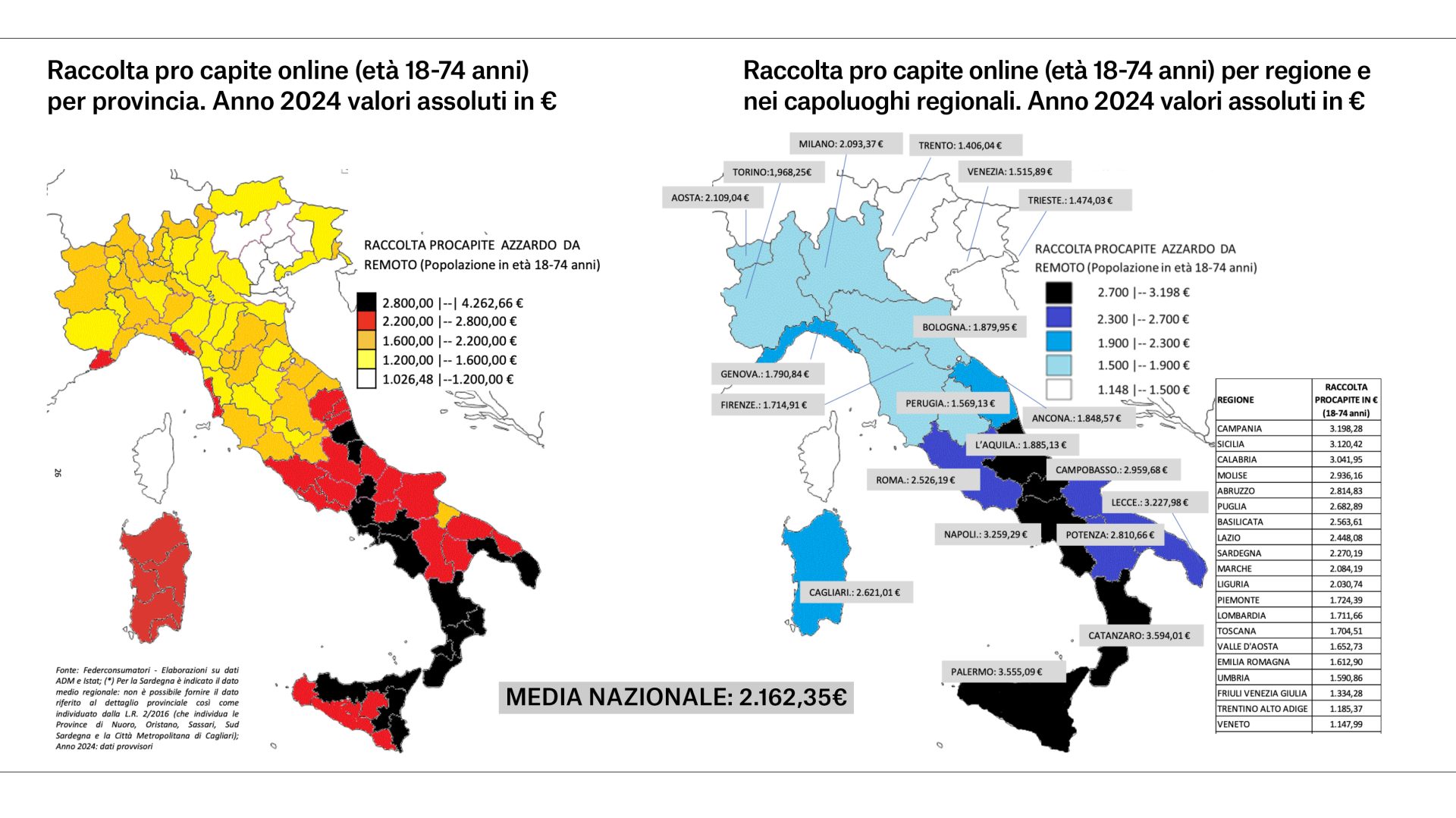
"There are profound differences between areas of the country, between provinces and municipalities, sometimes contiguous," we read in the Black Book: "Differences that in the case of slot machine data, unfortunately unavailable in detail, also concern the size of the physical network, but that in the case of online correspond dangerously to the map of illegal phenomena."
A new feature of this third edition is the summary of the top 10 Italian cities, where estimates of physical gambling are added to the online data and we discover that Rome has an average per capita, of total gambling, of 3,558 euros, Milan of 3,377, Naples of 4,546, Turin of 2,949, Genoa of 2,654 euros, Palermo of 4,548, Florence of 2,760. Bologna exceeds 3,000, Bari almost reaches 4,000, while Catania has the record with 4,803 euros per capita, two thirds of which collected online, as in Palermo.
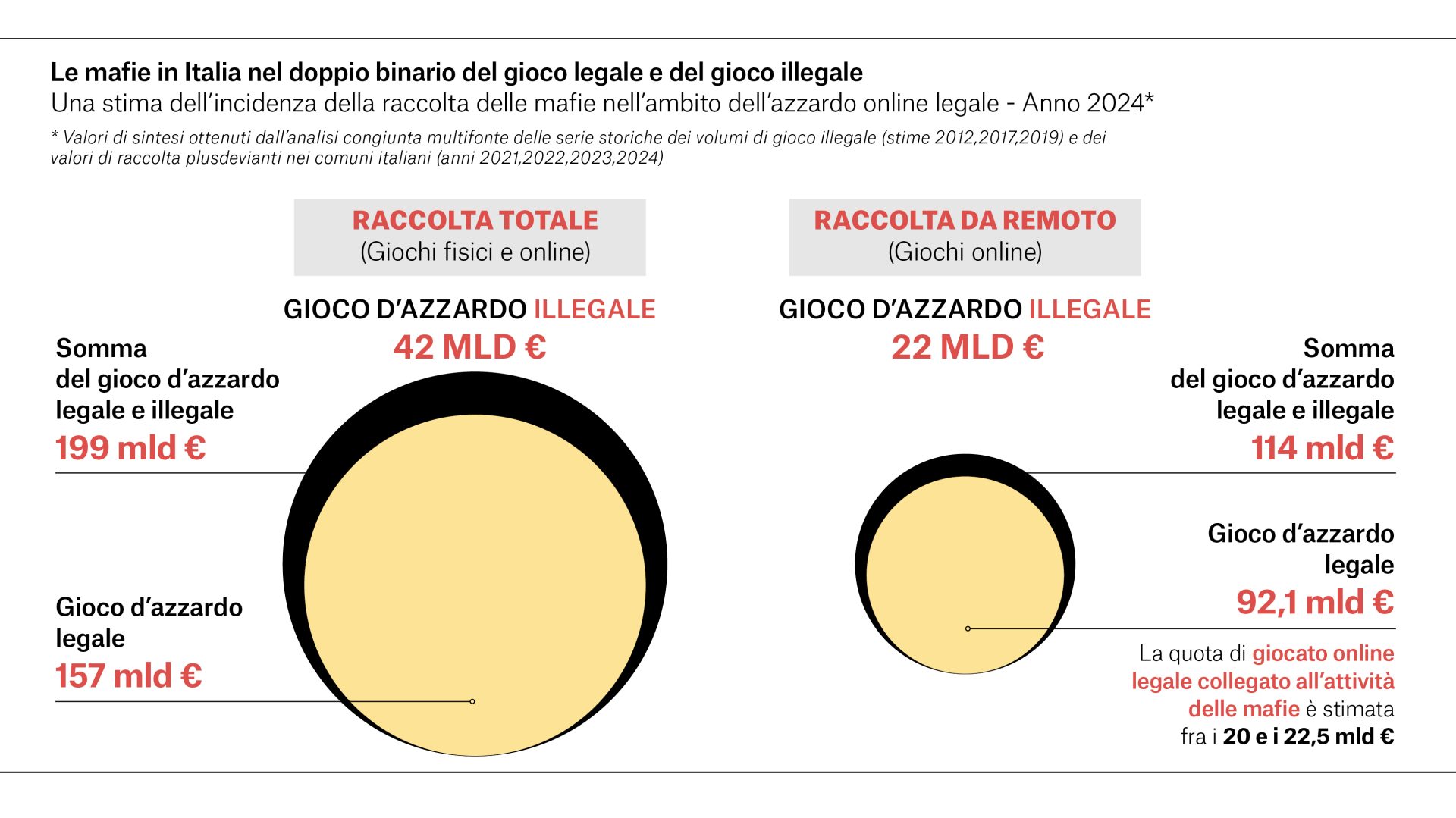
In addition to the analysis, the Blue Book offers proposals for concrete solutions that Massimo Masetti summarizes well, first of all focusing on the need " for a reduction in the offer that instead continues to scientifically increase. We have reached situations in which there are more than 4,200 different types of bets! We have now cleared the gambling issue, we have made it part of our daily lives and we are no longer able to communicate that, inherent in gambling, there is a high degree of danger which is the risk of falling into the pathology, moreover recognized by the National Health Service. Reducing the offer actually means reducing the demand. It is clear and evident that it must be done with a political will that leads to a reduction in tax revenue, furthermore we need a firm hand towards the concessionaires. Today instead we have a player that is the Customs and Monopolies Agency that should be the referee of this whole game, but that has now worn the jersey of one of the teams in an obvious way, for example making it difficult to have the data".
And then we need to "reduce the maximum bet and the consecutive playing time, while the time between one game and another should be increased, crossing off from the list of legal games those that we know are more dangerous from the point of view of addiction or mafia infiltration". So we need clear legislation, abandoning "this sort of vulgate in which gambling is an opportunity. On the contrary, gambling is a danger. Everyone then chooses whether to play or not, but aware of the fact that all games are designed to make the bank win, not the player. Which also happens in what I call the new frontiers of gambling or pseudo-gambling, that is, online trading and gaming "
The report also calls for: restoring as soon as possible the possibility of disseminating disaggregated data at municipal level; providing a real quantitative dimension of employment (direct and indirect) created by the gambling sector and the actual impact that would be generated – on those jobs – by serious regulation; rethinking the mechanism for recognizing and tracing online players.
Photo: Unplash
You read this article freely, without being blocked after the first few lines. Did you like it? Did you find it interesting and useful? VITA's online articles are largely accessible for free. We want it to be this way forever, because information is everyone's right. And we can do it thanks to the support of those who subscribe.
Vita.it





